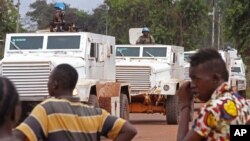Armed men in the capital of Central African Republic killed two men and three women and set fire to scores of homes, in violence that could further delay elections and prevent a visit this month by Pope Francis.
Witnesses said hundreds of people fled their homes in Bangui on Monday after the weekend attack by men from the mainly Muslim PK-5 neighborhood in which one man had his throat slit and more than a dozen people were also shot and wounded.
Brice Kevin Kakayen, a coordinator for the Enfants Sans Frontieres charity, said five were killed, part of a pattern in which at least 90 people have died violently since late September.
President Catherine Samba-Panza said U.N. peacekeepers had failed to halt the violence and called on the United Nations and the International Criminal Court to sanction political leaders behind the unrest.
"Additional efforts must be made to boost the interventions of the international forces and negotiate the placement of advance bases in the neighborhoods to ensure security at a local level," she said in a national address.
She exhorted the peacekeepers to take vigorous action so that "Bangui can be secured for the coming events that are crucial for the country. The pope's visit and the elections should be unifying events for the people of Central Africa."
Pope to Visit Mosque
The majority Christian country plunged into tumult when mostly Muslim Seleka rebels seized power in a coup in 2013, prompting lethal reprisals by Christian militias known as anti-balaka, and repeated bouts of bloodletting since then.
The latest attack appeared to be retaliation for a mob attack on PK-5 on Thursday in which four people were killed.
The pope is due to visit Bangui on Nov. 28-29 and go to a mosque in one of the most dangerous neighborhoods, but he hinted in an address on Sunday that the violence might lead him to cancel the trip.
Families in the Fatima district grabbed bedding and a few possessions and headed to camps for displaced people or to stay with families in the city's south, witnesses said.
"There is no disarmament in Central Africa. That is why the war still goes on," said Eugene Gazalima, a farmer and resident of the Fatima district.
U.N. peacekeepers have been stationed in PK-5 since last year. Tens of thousands of Muslims were driven from their homes in the capital last year by anti-balaka groups.
Authorities delayed presidential and parliamentary elections, in part because of the unrest, to Dec. 13, and they may be pushed back again if the violence persists.
A peace deal signed in May between 10 armed groups required them to disarm and possibly be charged with war crimes during the two-year conflict, but the brief optimism from the accord seems to have run out.
Nearly 400,000 people have fled to camps during the conflict, and an additional 440,000 have sought refuge in neighboring countries, according to an October report from the U.N. Office for the Coordination of Humanitarian Affairs.












